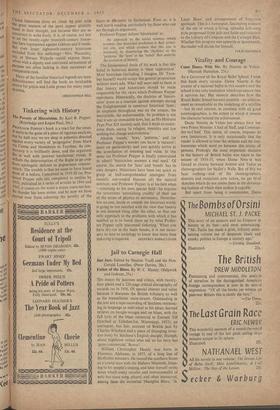Tinkering with History
The Poverty of Historicism. By Karl R. Popper. (Routledge and Kegan Paul, 16s.) ROFESSOR POPPER'S book is a tract for the times. It starts in the guise of a piece of rigorous analysis, but half-way we are deep in polemics directed against every variety of 'progrepive' from Marx via Comte and Mannheim to Toynbee. As con- troversy it is brilliantly done, and the argument fits In well with postwar intellectual trends. It reflects the determination of the Right to go over from apologetic defence to pugnacious counter- attack. The trouble is that we seem to have heard most of it before. Conceived in 1919-20 (so Pro- fessor Popper tells us), completed in outline by 1945, published as a series of articles in 1944 and ;9'45, it comes on the scene a dozen years too late. Its thunder has been stolen, and by now we have moved over from .admiring the novelty of the thesis to pin-point its limitations. Even so. it is well worth reading. particularly by those who can see through its arguments.
Professor Popper defines 'historicism' as : An approach to the social sciences which assumes that historical prediction is their princi- pal aim, and which assumes that this aim is attainable by discovering the `rhythms' or the 'patterns,' the 'laws' or the 'trends' that underlie the evolution of history.
The fundamental thesis of his work is that this belief in historical destiny is 'sheer superstition.' Most historians (including, I imagine, Dr. Toyn- bee himself) would accept this general proposition without more ado. What will seem odd to them is that history and historicism should be made responsible for the views which Professor Popper reprobates. Historically, the doctrine of 'histori- cism' arose as a reaction against attempts during the Enlightenment to construct historical 'laws'; its emphasis throughout was on the unique, the inscrutable, the unforeseeable. Its problem is not that it sets up immutable laws, but, as His Holiness Pope Pius XII recently said, that it tends to under- mine them, seeing 'in religion, morality and law nothing but change and evolution.'
Abolish 'trends,' laws,"patterns,' and (in Professor Popper's words) you leave 'a vacuum'; insist on particularity and you quickly arrive at the atomisation of meaning and value. In this sense (as Professor Popper is finally constrained to admit) 'historicism answers a real need.' Of course, the search for 'laws' and 'trends' has its own dangers. Historians have been too quick to grasp at half-comprehended analogies from (usually out-moded theories of) the natural sciences; and Professor Popper is. at his best when —returning to his own special field—he exposes the sometimes 'astonishing crudity' of their use of the terms of physics or astronomy. Neverthe- less no one, inside or outside the historical world, is going to rest satisfied with the view that history is one damned thing after the other, or that our only approach to the problems with which it has saddled us is to botch them up by what Profes- sor Popper calls 'piecemeal tinkering.' When you have dry-rot in the main beams, it is not neces- sary to turn to sociology to know that more than














































 Previous page
Previous page